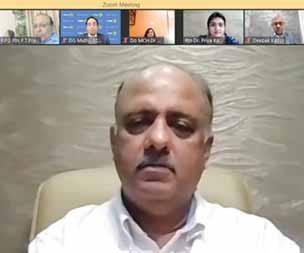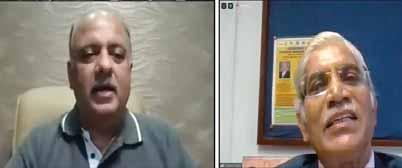
12 minute read
Measles, rubella can be eradicated by 2023: Jacob John
By eradicating polio from India we are contributing `600 crore per annum for our national wealth. If we eradicate measles and rubella (MR), though I have not calculated the health economics, I can assure you that our nation will become healthier and wealthier,” said virologist Dr Jacob John. Health is not only a measure of a nation’s development but a means to its development, he said, addressing Rotarians, Inner Wheel members, Rotaractors and Interactors from 30 Rotary districts at a multi- district virtual seminar titled ‘Battle against Rubella’
Jaishree
Advertisement
organised by RID 3232. Dr John heads the government’s India Experts Advisory Group (IEAG) for eliminating MR and is member of RC Vellore, RID 3231.
Rubella or German measles, as it is also known, is harmless. But if a pregnant woman contracts the virus in the first trimester of her pregnancy there is 90 per cent chance that the child will be born with multiple birth defects.
To a question from an Interactor of the TNPL Public School, Karur, on the dangers of rubella, Dr John explained that rubella and zica are the only two viruses that will cross the placenta and infect the foetus, consequently affecting its ears, eyes, bones and marrow. The child will be born with birth defects such as hearing impairment, cataract, heart abnormalities and mental retardation.
“What can be the greatest pleasure in life will turn out to be a trauma for the child and the parents. Unlike polio, the task here is easy,” said RIPE Shekhar Mehta. “All we have to do is create awareness and identify young girls who have not been vaccinated.” Recalling how deeply involved the late PRID Y P Das was in this programme, he added, “eradicating MR will be our best tribute to him.”
Dr John said the WHO deadline of 2023 for MR eradication is achievable because 95 per cent of the work is already done. MR vaccine is part of the routine Universal Immunisation Programme (UIP). “If all Rotary districts gear up social mobilisation for routine immunisation in their regional areas, we can eradicate the disease in three years.”
Sri Lanka had already eradicated MR, he said and “we could learn from this island country.” The MR vaccine was safe, if properly handled, Dr John said, dismissing reports
that people had fallen ill after being given the MR vaccine. “Even if you inject water children will fall ill. MR vaccines will never cause illnesses. The child might have mild fever for a couple of days as that is the body’s response to the vaccine.”
The meet emphasised the need for Rotary to spread awareness about rubella in a committed manner as Rotarians did for polio eradication, said PRID P T Prabhakar, who moderated the seminar. He said RIDE Mahesh Kotbagi, who participated, has done measles vaccination for 100,000 rural girls through a global grant.
INPPC chair and member of the IEAG Deepak Kapur detailed Rotary’s action plan for MR elimination by 2023, and said Prabhakar wouldn’t have been able to put together “this wonderful programme without being prodded by his wife Nalini” who had done a lot of work on rubella eradication.
Vaccines against diseases like measles and rubella are sometimes languishing in government storage and PHCs while 90,000 people, mostly children, die of measles every year. Thousands of vials are being destroyed because their expiry dates have passed. There is not enough demand from the community, he rued.
Kapur recalled Dr John’s initiative that led to Rotary’s participation in the programme. “I remember how he convinced past RI presidents Rajendra Saboo, Kalyan Banerjee, past director Sushil Gupta and me that MR elimination was a ‘low-hanging fruit and tailormade fit for Rotary.’ Given the extreme recognition that Rotary has garnered due to its proactive role in the fight against polio, this programme would be right up Rotary’s ally, with its 3,400-plus Rotary clubs and 150,000 Rotarians.”
When Rotary proposed this action plan to the then Union Health Minister J P Nadda, he welcomed it. On Dec 6, 2017, an MoU was signed between the health ministry and Rotary to promote ‘Mission Indradhanush’ or routine immunisation with special focus on MR. “We proposed advocacy, assisting the government in operations and basically helping to fire up people’s movement. We were certain that the programme will be successful if people demanded the vaccine instead of the government imposing it on them,” he added.
Rotary’s structure against the fight RI’s National PolioPlus Committee in India has two tasks — to ensure that India remains polio-free and to fight MR. INPPC has a district coordinator (DC) in each Rotary district. Nalini Prabhakar is the DC in RID 3232. The DCs should set up a committee of Rotarians, their spouses, Rotaractors and Interactors to coordinate the efforts of Rotary clubs in the district.
Rotarians can visit the district chief medical officer (CMO) or the immunisation officer, get a list of the PHCs that carry out MR vaccinations and ensure the task is done on the designated days. Rotarians can check if the centres have adequate stock of the vaccine and its efficacy.
The target was tantalisingly close but the deadline had already passed, the Covid pandemic, inflicting a 30 per cent drop in immunisations across the country. “But the process has restarted. It is time to put our shoulder to the wheel once again.
RIPE Shekhar Mehta

You are on the cusp of creating history by eradicating polio, and now MR,” urged Kapur.
Open house DGE N Sridhar, RID 3232, wanted to know if oral polio vaccine and injectable MR immunisation can be made simultaneously on the NIDs. Dr John replied that oral polio vaccine can be given the same day along with the MR injectable vaccine but cannot be linked with the polio NIDs as MR vaccine must be given in a routine manner.
Nalini said, “our advocacy should reach girls until their child-bearing age. Even now many parents and girls are not aware of this. It is a onetime vaccine that should be given to girls before they conceive their first child.” She urged Rotarians to visit colleges and create awareness among girls. Prabhakar suggested that marriage halls should insist on rubella certificate from the bride. “This practice is in vogue in several marriage halls in South India.”
Dr Nalini Ramamurthy, deputy director, Department of Virology, Kings Institute, explained about rubella and its debilitating effects. DG S Muthupalaniappan welcomed the participants.
Youth must get skilled for excellence: RIPE Shekhar Mehta
At a time when thousands of people are losing their jobs due to the corona pandemic and other reasons, holding webinars on skilling students and youth is the need of the hour and in tune with the National Education Policy 2020, said RIPE Shekhar Mehta. “We have to make them understand the need to enhance their skills and bring excellence in their work,” he said at the valedictory session of Enterprise Education webinars, a series of online programmes hosted by RID 3131, for school students and young professionals. The valedictory session was co-hosted by RID 3292’s Rotary Nepal Literacy Mission.
But in India, lack of dignity of labour is a big concern that needs to be addressed by Rotary, he said and quoted Gandhiji who said “everyone’s role in the community must be respected.” Despite our huge population and demand for skilled services, only five per cent of students get vocational training whereas in Korea, a small but more developed country, 90 per cent of students undergo skill training. Even in a well-developed country such as Germany, over 50 per of youth get vocational training, he noted. “If I need an accountant, there are over 100 applicants for the job. But not even 10 of them would have updated their knowledge with the right skills needed for the job,” he rued.
There is a huge potential for small scale industries to thrive in India if right skilling is given to the youth who must be made to understand the value they bring to the table with such
V Muthukumaran
RIPE Shekhar Mehta

updated skills, Mehta explained. “We need to have a passion for excellence. Rotary India has taken up skill development programmes for 30,000 widows and single mothers. Of which, 6,000 women are being trained now by Apollo Medskills through a twomonth online course followed by a one-month hands-on programme, after which they will be absorbed by the trainer.”
Rotary Nepal Literacy Mission under PDG Tirth Man Sakya and IPDG Kiran Lal Shrestha has come a long way in its journey to achieve total literacy in the Himalayan country, he said, adding, “PDG Muhammad Faiz Kidwai has single-handedly taken up literacy projects in Pakistan.”
Webinar series Four webinars were hosted by RID 3131 since July with over 400 participants including Rotaractors, Interactors and teachers from government schools across Maharashtra. “A study of the school education system in western countries shows that they give importance to enterprise education right from elementary schools. We identify
Rtn Pradeep Wagh
the skills that can be developed among students through webinars that boost self-confidence, ability to collect information and sharpen the decision- making process. Teachers are also given appropriate modules to develop enterprising skills among students,” said Pradeep Wagh, district mentor, International Service, RID 3131.
A Preliminary Business Plan Competition was held for Rotaractors and Interactors in which 23 presentations were received by the jury panel. RAC Mhow Community, RID 3040, bagged the top prize with a certificate and cash prize of `10,000 for its urban plan, An initiative towards ‘No waste city’ which was presented by a four- member Rotaract team. Rtr Mala Dhital (RAC Itahari, RID 3292) and Intr Swarali Vaidya (Interact Club of City Pride Junior College) were runners-up.
RID 3131-DLCC Subodh Malpani, District Literacy director Deepa Bhagwat, IPDG Dhiran Datta, RID 3040, PDGs Pramod Jejurikar, Chandu Agarwal, Muhammad Kidwai and Rtn Nitin Naik, chairman, Cubix Tech, participated.
Invest in the future through the Foundation
In the early 1870s, a genius toiled in his laboratory, driven by a vision to improve life through technology. After many failed attempts, by 1880 Thomas Edison had perfected a new light bulb that could be produced on a mass scale. When someone pointed out to him that he had tried and failed 10,000 times before succeeding, he responded that he had merely found 10,000 ways it wouldn’t work! Just like Edison, The Rotary Foundation is driven by a vision for a better world. And we, too, remain determined and creative in the face of setbacks.
Earlier this year, our vital polio immunisation activities had to be temporarily paused to ensure that the polio eradication programme did not contribute to the Covid-19 pandemic. And so we adapted: The polio-fighting infrastructure that Rotary helped build was enlisted to assist in the response to Covid-19 in many vulnerable countries, as we had done before during outbreaks of Ebola, yellow fever, and avian flu.
Thankfully, we resumed polio immunisation activities in July, having first taken all precautions to protect frontline workers and communities. During these challenging days, our business — reaching out to people in distress — is not business as usual. The way we prepare and deliver projects and the methodology we use need to change. And the way we communicate what we do also must change.
The success of our global grants model is unmistakable. At its introduction in 2013–14, the Foundation awarded 868 grants worth over $47 million. By 2019–20, the number of approved grants had risen to 1,350, worth over $100 million. While the number of grants shot up by more than 50 per cent, and funding by 123 per cent, corresponding Annual Fund contributions showed only a five per cent increase, and that’s troubling.
To reach those who need us, to spread the love that our Foundtion brings, we will need to rise to this challenge and work together to meet our funding needs. Mother Teresa once said that if we want a message of love to be heard, it has to be sent out. To keep a lamp burning, we have to keep putting oil in it. TRF offers the best opportunity I know for us to invest in a better future for communities around the world. Your generosity today and throughout this year is the oil that keeps our grants burning bright, reaching the ones who need us most.
K R Ravindran Foundation Trustee Chair
When in Rome

Hank Sartin
Taiwanese people pride themselves on their hospitality and friendliness. When you are in Taipei for the Rotary International Convention from June 12 to 16, you may receive invitations to socialise with local Rotarians. To make a good impression and avoid giving offense unintentionally, here are some etiquette tips to keep in mind.
Though shaking hands has become customary in business settings in Taiwan, you can also adopt the more traditional greeting, a slight inclination of the head. Exchanging business cards is a very common practice, and there is a specific protocol for doing it: Be sure to present your card with both hands. When you receive a card from someone, don’t just slip it in your pocket; hold it with both hands and take a moment to read it. You are giving this person, and their card, your full attention.
Food is so important in Taiwanese culture that a common greeting is “Chi bao le ma?” which means “Have you eaten?” When entertaining, your host might put food on your plate for you to try. The same principle that you were taught as a child applies: Eat what is offered to you.
Taiwanese people are enthusiastic about exchanging toasts. A traditional toast is performed holding your glass with both hands. You invite your friend to drink, they hold up their glass, and looking each other in the eye, you drink together. If someone approaches you with a glass in hand and says “Ganbei!” or “Hodala!” that is the equi alent of saying “Bottoms up!” You should drain your glass. And if you prefer not to drink alcohol, it’s perfectly fine to do your toasting with a soft drink or tea. Your hosts want you to feel welcome.
Learn more and register at convention.rotary.org.







